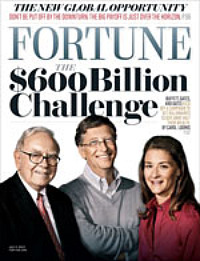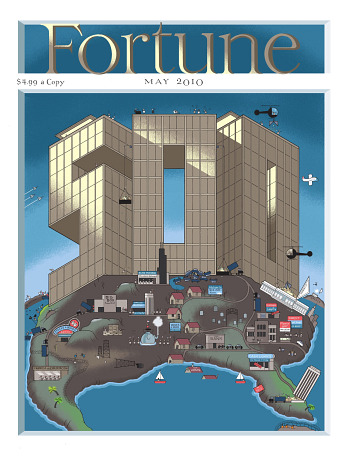Fortune is the happy-go-luckiest magazine in business these days. Which means it’s way out of step with the times.
Why, reading its pages you’d barely know there was a big ol’ recession and financial crisis going on. Becky Quick’s column calling for prosecutions on Wall Street was good (as I noted earlier), but it’s a lonely boo bird in a sea of “Go, Team Corporate Capitalism!”
Take a stroll through the table of contents.
The cover story is a wet kiss to Warren Buffett and Bill and Melinda Gates, who are asking other billionaires to give their money away, something Fortune—Buffett’s house organ (he’s name-checked in at least seven pieces in this issue) —says, breathlessly, “could change the face of philanthropy.”
Next, there’s a feature on “The New Global Opportunity,” telling readers “there’s never been a better time to scour the world for innovation and profit.” Well, I can think of lots of better times. But corporate globalism is always on the march at Fortune, which gives us this quote:
“If we stop thinking of the poor as victims or as a burden and start recognizing them as resilient and creative entrepreneurs and value-conscious consumers, a whole new world of opportunity can open up.”
Nice.
There’s the glowing profile of the titan of industry—a chemical industrialist, natch—who’s a “true American original” with “unparalleled tenacity.”
Good read.
Then there’s the triumphant corporate-turnaround piece, this one about Union Pacific. Its headline: “Union Pacific railroad builds U.S. economy,” which has the benefit of being true, actually.
If you’d been wondering how Fortune could take an environmental catastrophe caused by corporate negligence (at best) and spin it into a positive story for capitalism, here’s a short story on who’s profiting from BP’s oil spill. The kicker:
At a Venice, La., marina, Lee McLean is a captain working with BP. He’s earning double his usual day rate of $1,200 and grins when he says, “I want to know how long this faucet stays on.” Looks like a very long time.
There’s an installment of “Top Performers: World’s Most Admired Companies,” a feature on how “Pandora’s Founder Rocks the Music Biz,” a reassuring story on why you should stay in the stock market, a column warning about overreacting to the BP catastrophe, a favorable Q&A with the CEO of the company that makes the dispersants the EPA told BP to quit using on the oil spill and which is banned in the UK because it can cause health problems.
In short, Fortune paints a picture of the corporate world so rosy it’s almost unrecognizable. And so, while it’s individual pieces may be accurate (and for that matter worthwhile), the whole adds up to something that’s deeply misleading.
That’s as good an excuse as any to repost Chris Ware’s awesome Bizarro Fortune 500 cover (make sure you click through to see the big version).
— Further Reading:
Fortune Sounds Out of Tune With a Facebook Piece: Add one more to the long list of hero CEO profiles in the hallowed pages of Fortune.
Chris Ware Shows Fortune the Mirror on the 500: Limits to what can be said in the friendly confines of the business press.
CNBC’s Quick Pushes for Prosecutions in Fortune: The combo of CNBC and Fortune, while not quite a WSJ editorial board/Forbes sandwich, doesn’t exactly make you think McClure’s. So applaud Becky Quick for taking prosecutors to task for not bringing cases against Wall Street.
Ryan Chittum is a former Wall Street Journal reporter, and deputy editor of The Audit, CJR’s business section. If you see notable business journalism, give him a heads-up at rc2538@columbia.edu. Follow him on Twitter at @ryanchittum.



